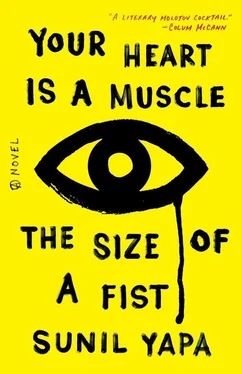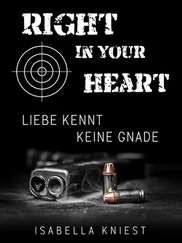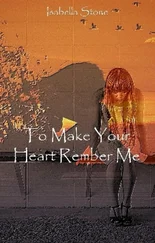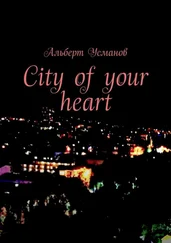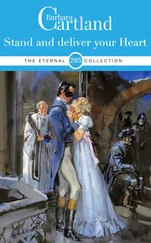He risked a glance at the police. They were pointing strange guns at the sky. He turned back to the crowd and saw blossoms of smoke sprouting from the ground. People with bandannas to their mouths, coat sleeves pressed to their faces, eyes and nose sunk into the crook of their elbows.
This was tear gas. It took more than a moment for him to realize it. He looked to the cops. Looked to the crowd. Looked back to the cops, the glass entrance of the convention center beckoning behind them, staff, janitors, and such, watching.
Blasts punctured the air. The police had not calculated the wind before they fired. And now it was gusting strongly from the west, was blowing the gas straight back into their ranks. Charles saw it not rising above the crowd, but moving low and fast, close to the ground, a roiling fog of gray smoke sailing through the crowd and past him, as if being sucked into the convention center by a vacuum, and still they were firing. Explosions tore at the air. Canisters crashed into the ground. He felt the poison drift collecting in his clothes. Tasted the grit of it on his teeth, his tongue. Away from the convention center. And even now he wanted to resist, wanted to stay.
Even now he thought he could still get in. He could still make the meetings.
His ears ringing, he bent and ran toward the line of cops. One of the skyward guns descended level with his chest.
“I Am. A. Delegate!”
Shouting in the roaring air like shouting in a train tunnel with the train passing over your face.
“I Don’t. Give. A Fuck.”
Charles pointing at the center, point, point, pointing, and waving his badge.
“I. Need. To Go. In. There.”
Like trying to talk inside an airplane engine.
“You Are. Not. Going. In. There.”
“I. Have. Meetings.”
Like popping the door of a plane at thirty thousand feet and trying to conduct a conversation on the wing.
“Return. To. Your. Hotel.”
And now the man’s gun was at his side, and his baton was in his hand. He jabbed Charles in the gut, a beautiful shot to the solar plexus, perfectly aligned with button and tie.
Charles went to his knees. Sucking air and still trying to talk his way in.
“I. Have. Very. Important. Business.”
And it seemed the cop, too, had very important business, because the baton which had poked him was now rising to strike him down. The convention center a mere twenty feet away, and yet impossible, closed to him and his desires. He turned from the glass then, from the steps and the police, his heart already plunging in his chest, his eyes watering, and he fell. Landed hard on cold pavement. Felt the shock through his knees. The rawness of his palms.
Someone took him by the elbow and helped him to his feet.
It was the young man in socks and sandals. The young man who seemed to think he was out here to save the Third World. He had Charles’s hand and was leading him away from the police. First they walked. And then they ran.
Arm in arm. Hand in hand over the slippery streets.
And already, even as he ran, jacket flapping, hair wild, already he was thinking, Canceled? God help me, did this boy say my meetings are canceled?
Victor breathed and counted his breaths and focused on the rise and fall of his chest. The low pounding of the chant was like a blood beat in his temple. The gas an opaque cloud blanketing the intersection, radiating weird light. His heart was racing, each breath bursting from his mouth like a small explosion, the hot shame like a stone held on his tongue because he was afraid. Fear had taken over his being and he knew if he could chant he wouldn’t be so shit-scared, but he just couldn’t do it.
Victor had been on the road for three years, had circled the globe, east to west, and north to south. El D.F., Tegucigalpa, San Salvador. Shanghai and Hong Kong. Bangkok and Delhi. He trusted small signs, the ordinary language of everyday things. He grew a beard and lost weight. His skin took on odd fragrances. He ran out of money. He found a way back home where he could earn in dollars: he worked potatoes; he worked apples, stretching as tall atop an apple ladder as his skinny frame would allow. He tried waiting tables and only lasted a week. Couldn’t take it. He liked to be outside where he could hear the birds and the banging trucks, watch the planes trailing overhead, sleep under a tree during his lunch break if he wanted, the crunch of leaves beneath his head reminding him that he was still just an animal on a planet spinning through space. He liked to remember that. It was important to remember that. One fall he worked the wheat harvest, mucking and cleaning and moving north. Soon as he had enough money, he was off again.
He traveled because he knew he did not belong. The home where he had been born was not his home. Something was missing. From him or from his home, he didn’t know, and so he wandered. He roamed and tramped and traveled, looking for what he didn’t know. Tierra del Fuego to the Atacama and the Andes. From the Ganga to the high Himalaya. Victor remembered a meal of lentils and rice in Kathmandu overlooking a narrow lane where women gathered to sell nuts and buffalo milk. That was the day he saw the body burning on a pyre of six-foot logs, the white-hot flames licking at the arms and legs and head, the flakes of ash drifting like bits of leaf over the river.
He had wanted a knowledge born not from any school or teacher, but from his own eyes and ears. From his own brown body alone in the world. An experience and knowledge woven from every person he ever talked to, every bus station and hostel, every meal he had ever eaten squatting against a mud-stained wall, the hundreds of faces of the people he had met, the creased smiles, the yellow teeth, the bloodshot eyes. Where did he belong? To whom did he belong? He didn’t know. He liked to walk. Sometimes he just wandered a city, trying to enjoy the feeling of being lost, the feeling as if he were a satellite thrown open to every channel.
The way a woman ate from a ceramic bowl sitting along the seawall in Havana. The way her hands moved as she argued with a friend.
Burning cars blocking the winding road which crossed the border between Peru and Bolivia — a protest against rising gas prices — and Victor opened his pack and sat and shared his crackers and talked with the young men, with the women in their bowler hats, and did they let him through because of his brown skin or because of his Spanish, bad as it was? Or did they just appreciate the talk, the crackers, the companionship and interest and salt.
Conversations wandering the back streets of cities so large he could have walked forever and never reached the end of every lane, seen the end of every shop.
A old man in pajama pants pushing his bicycle through the back lanes of Old Shanghai. Across the river, a young man working a backhoe in a new office park, sitting high and formal in the cab wearing a blue suit and tie.
People’s fucking faces. He watched and lived and he felt a million distinct and separate truths beginning to accumulate within his chest like a murmuring crowd. It was an ache inside a need, a white-hot expansion of memory and intuition.
A blind girl begging change in Delhi, flies around the empty sockets of bunched flesh.
Further north, in a tiny mountain town, playing chess and drinking tea, while young guys stood around in sunglasses, watching the game beneath a movie poster, sharing a cigarette among them, lighting the next from the coal of the last.
In Chile, Victor for hours on a cliff, hours watching the endless succession of waves crashing against a continent’s edge. Hours spent watching and waiting for what? It was so easy to forget what he had come for. And just a kid without a system, without a political framework, the more he saw, the less he understood. A million singular truths accreting inside him. A million strands. A needle moving so fast he couldn’t see it, could only feel it, inking a new face, a new line, a new story. Just woke in the morning with a new tattoo he could never see, could never share. Just felt it deposited like crushed color beneath the skin.
Читать дальше
